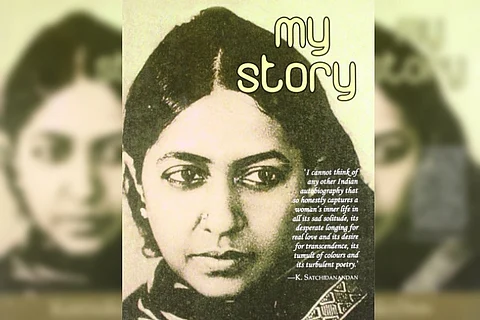

There are no flower wreaths, no roses, not a single sign of anyone having visited that little space between two tombstones in Palayam Juma Masjid, Thiruvananthapuram, where Kamala Surayya was laid to rest 10 years ago. There is no name to mark her grave, nothing at all to identify the final resting place of Kerala’s much celebrated writer who wrote in Malayalam and English. Only a man to guide you there when you ask where she lies.
Quietly, the lone visitor takes a picture of the deserted graveyard, Kamala’s place is between two sets of plants and next to a tall tree. That’s where she wanted to be buried, newspapers had written in June 2009, a day after the public paid homage to her body brought to Kerala from Pune. The land she had escaped to after Kerala turned too hostile to the writer they had once fondly hailed for honesty.
At 32, Kamala – then Kamala Das or Madhavikutty, the pen name she’d adopted – wrote her life story, baring herself and all her relationships that people in 1960s Kerala found too much to take. She had at the time an illness that she thought would take her life. It didn’t seem to matter to the then 32-year-old if the world knew how weak she was in matters of the heart, a marriage (that began at age 15) not stopping her from reaching out to love from elsewhere. And all her life, she’d famously reached out for love, over and over again. Many believe her late conversion to Islam too had been prompted by love for a man from another religion.
Photo Courtesy: Sreedharan TP / Wikimedia Commons
Kamala, in one interview, said she never regretted writing My Story, that’s her best work, and in another said My Story had ruined her life. If in the '60s and '70s, Kamala’s words - all thousand of them (she once claimed she knew only so many) – in prose and poetry, about body and sex shocked her readers and found her secret admirers, the conversion in the late '90s – 10 years before her death – brought her new attention. Reading about the abusive words that came to her as letters, one can’t help draw parallels to times like now when an opinionated woman, not unlike her, gets the same treatment on social media. Madhavikutty could at least change addresses from Kerala to Maharashtra, rid herself of the hatred and hope to find peace. It’s hard to imagine how a sensitive soul like her would have survived the age of social media and WhatsApp.
Her choices continued to make impact years after her death – an actor saying no to playing her in a Malayalam movie, reportedly due to threats. Aami, the movie made on her life, was directed by Kamal with another actor, and Madhavikutty’s admirers – whether they liked the film or not – went back through the years to remember the writer all over again. Memories dropped by from nowhere. Writer Priya AS quietly remembered visiting Kamala with glass bangles and how every time after that she would be called Kuppivalakutty. Montreal writer Merrily Weisbord who wrote a memoir of her dear friend Kamala, (The Love Queen of Malabar: Memoir of a Friendship with Kamala Das) feuded with director Kamal who claimed there were lies in her book.
Kamala Surayya's grave in Palayam Juma Masjid
Yet, with all these controversies, Kamala lies neglected on her 10th death anniversary, between two saplings planted across her grave. The plants wave when the lone visitor asks if Kamala has anything more to say to the world. Ten years ago, when her body was brought to the University Senate Hall in Thiruvananthapuram, the same visitor had followed the long queue to see her face for the first and last time. The familiar face, with the twitching pair of eyes now closed forever, somehow seemed content to leave the world, the many names and robes it had brought her, and the words it had made her write.